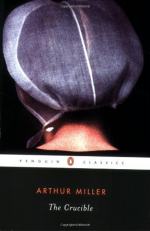|
This section contains 647 words (approx. 3 pages at 300 words per page) |

|
"The Crucible": The Natural Effects of Forgiveness
We often think of forgiveness as something that someone who has done us wrong must ask of us. It is a gift that you give to yourself, not to others. Forgiveness is a process of inner healing, a feeling that you know you've done wrong and need to cure, a trait which the people of Salem did not posses. This human trait heals the body of sin which every sinner had throughout the play such as Abigail, Elizabeth, and Proctor.
Elizabeth and John are both plagued with dishonesty and tension since they were married to each other. Isolated and bewildered by masking each other's true emotion, their lack of forgiveness slowly tears them apart, separating them further from each other. For example, while at dinner Elizabeth develops a suspicion on Proctor "Spare me! You forget nothin' and forgive nothing" (Miller 852; act 2). Their anger...
|
This section contains 647 words (approx. 3 pages at 300 words per page) |

|


